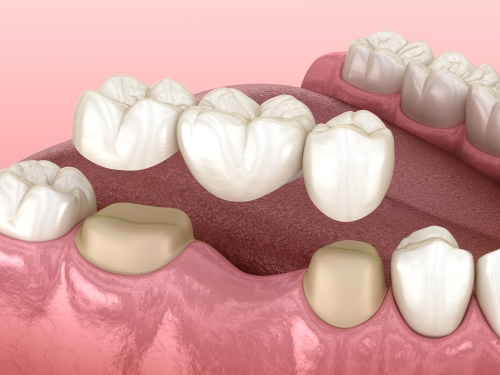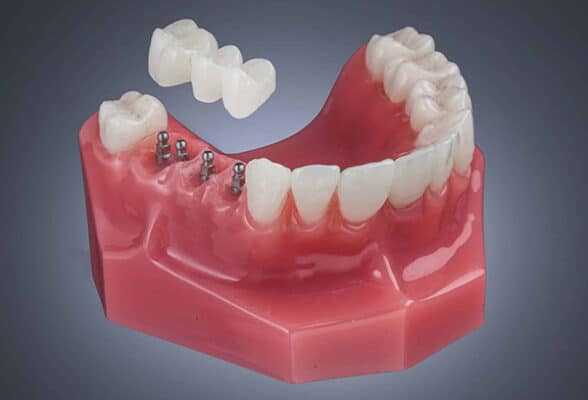Dental Bridges in Foley, AL
A bridge is a structure designed to span the distance between one point and another. Take the Foley Pedestrian bridge, which allows pedestrians to visit John B. Foley Park while passing safely over Alabama 59. A dental bridge works similarly. By bridging the gap left by missing teeth, a bridge allows you to eat comfortably and smile confidently.
Historically, dental bridges have been a trusted solution for replacing missing teeth, restoring smile aesthetics and improving oral function. But thanks to advancements in modern dentistry, bridges now come in several types to suit different needs—including those supported by dental implants. At Riviera Dental Care, we use dental bridges to restore missing teeth and bring back confident, complete smiles!
What Is a Dental Bridge?
A traditional dental bridge replaces missing teeth while relying on the surrounding healthy teeth for stability.

Typically, bridges consist of crowns fused together that connect to the healthy teeth on either side of the gap. Attached to these crowns are the replacement teeth—also known as pontics—that fill the gap between them.
To place the crowns and secure the bridge, we must first alter the structure of your healthy teeth. Using specialized dental tools, we shave down some of your enamel to make room for the crown. Then, we place the bridge in, cementing the crowns to the support teeth.
In some cases, we can design and create your dental bridge in one visit. With CEREC technology, we digitally scan the treatment area, design a custom bridge, and craft it on-site using our advanced milling machine. During your consultation, we’ll determine if this efficient same-day option is right for you.
Dental bridges have the potential to last 30-40 years, but only if you practice good oral hygiene! Just like your natural teeth, you must take care of your bridge and attend routine dental visits to keep your smile healthy and functional.
Types of Dental Bridges
While a traditional dental bridge is the most common type of bridge, there are others that suit different needs and preferences. These include:
Cantilever Bridge
A cantilever bridge functions much like a traditional bridge but requires only one crown instead of two. For these bridges, the crown is typically attached to just a single pontic. While not quite as strong as a traditional bridge, it’s a great option when you’re missing a tooth and have only one healthy tooth to support the bridge. By relying on the strength of the healthy tooth, a cantilever bridge holds the pontic in place, filling the gap in your smile.
Maryland Bridge
Unlike a traditional or a cantilever bridge, a Maryland bridge doesn’t use crowns for support. Instead, its porcelain or metal “wings” attach to the back of your remaining teeth. While this method is stable, it is better suited for front teeth, which don’t have to endure as much chewing pressure. We recommend a stronger solution for missing teeth in the back of the mouth, such as an implant bridge.
Implant Bridge
An implant bridge relies on either traditional dental implants or mini dental implants for support. We place these titanium posts into your jawbone to anchor the bridge. The implants mimic the function of tooth roots, providing stability and function without affecting your surrounding teeth.
Because of their firm connection to your jawbone, implant bridges are often more stable and long-lasting than traditional bridges.
Roundhouse Bridge
A roundhouse bridge is a full-arch restoration that replaces an entire row of teeth. It functions like a denture but offers much greater stability and doesn’t need to be removed. Unlike smaller bridges that replace just a few teeth, this option restores your entire smile. Depending on your jawbone structure, we will place 6-12 mini implants to securely anchor the bridge.
With its sleek, horseshoe design, this restoration replaces an entire row of teeth without the bulky pink base that traditional dentures use. As a result, you can look forward to a more natural appearance, a comfortable fit, and improved speech and chewing.
While roundhouse bridges can last a lifetime, they must be cared for properly. Brushing your teeth, using a water flosser, and keeping up with your routine dental visits are key to keeping your smile beautiful and your mouth healthy.
Securing a Dental Bridge With Mini Dental Implants
Although both traditional and mini dental implants anchor dental bridges, we often use mini implants due to their many benefits for patients.
Where traditional implants are about 5 millimeters in diameter and consist of multiple parts, mini implants are less than 3 millimeters and have a one-piece design. Their smaller size allows us to make a narrower opening in your jawbone without needing incisions or stitches. We simply make a small pilot hole and gently secure the implant in place. Due to the implant’s unique design, it’s stable enough to support a restoration immediately. Since mini implants are a single, streamlined piece, we can complete the entire procedure in just one day, giving you a fully functional, beautiful smile without a long wait.
Mini dental implants offer faster results, quicker healing, and strong support for your dental bridge—all at a lower cost than traditional implants. With fewer appointments and a more comfortable procedure, they’re a great choice for restoring your smile!
Bridge the Gap in Your Smile at Riviera Dental Care!
The Foley Pedestrian Bridge provides a safe path across a busy highway, offering a secure and convenient way for residents and visitors to enjoy our community. Similarly, a dental bridge spans the gap left by missing teeth, providing a secure solution for eating, speaking, and smiling with confidence.
At Riviera Dental Care, we offer custom dental bridges to suit a wide range of patient needs. Schedule a consultation to learn which kind of bridge is best for you.
Frequently Asked Questions
The cost of a dental bridge depends on the material we use, the type of bridge, and how many teeth we’re replacing. For example, an implant bridge has a higher initial cost than a traditional one because of its greater stability and long-term benefits. Additionally, a bridge that replaces an entire arch of missing teeth will naturally cost more than a bridge that replaces just one or two.
At your consultation, we will help you make a choice that meets your dental needs and aligns with your budget. In many cases, dental insurance will cover part of the treatment costs for a bridge. However, insurance coverage varies. If you’re unsure what your policy covers, we can help you understand your benefits.
To help with out-of-pocket costs, we also offer flexible financing plans through third-party companies. These plans allow you to manage your treatment costs with affordable monthly payments! If you have any questions about insurance or financing, don’t hesitate to contact our experienced and compassionate team.
Dental bridges are fixed restorations, so they’re not removable. If you’re looking for a restoration that you can take out yourself, we’d recommend a partial denture. Otherwise, your dental bridge is intended to stay cemented to your natural teeth or dental implants.
Should your bridge become loose or fall out, reach out to Riviera Dental Care as soon as possible. If it’s still intact, we may be able to reattach it. Otherwise, we’ll craft a replacement to restore your smile’s function and appearance.
Yes, food can get trapped under a dental bridge. While it’s not a major issue if you maintain proper oral hygiene, food particles can accumulate in the spaces between the bridge and the gums or adjacent teeth.
It’s very important to brush your teeth daily and use a water flosser to reach the areas a normal toothbrush might miss. For the best results, be sure to attend your regular cleanings at Riviera Dental Care!
Related Videos
- What Is a Dental Bridge?
- What Is an Implant-Supported Bridge?
- Does Insurance Cover Dental Bridges?
- What Is a Dental Implant?
- What Is a Mini Dental Implant?
- What Are the Advantages of One-Piece Implants?
- Conventional Implants vs Mini Dental Implants: Key Differences
- What Issues Can Dental Implants Treat?
- The Benefits of Mini Dental Implants
- What Are My Options for Replacing a Single Tooth?
- What Are My Options for Replacing Multiple Teeth?
- What Are My Options for Replacing All of My Teeth?
- Who Is a Candidate for a Mini Dental Implant?
- What If I Don’t Have Enough Bone for a Conventional Implant?
- Is Bone Grafting Required for Mini Dental Implants?
- The Mini Dental Implant Process: A Step-by-Step Guide
- How Long Does the Mini Dental Implant Process Take?
- Is Getting a Dental Implant Painful?
- Can I Get a Dental Implant Immediately After Tooth Extraction?
- Healing After Dental Implant Surgery: What to Expect
- What Can I Eat After Implant Treatment?
- Are Dental Implants Safe?
- How Long Do Mini Dental Implants Last?
- How Do You Determine the Best Type of Implant?
- How Much Do Dental Implants Cost?
- Does Insurance Cover Dental Implants?
- Do You Offer Financing for Dental Implants?

